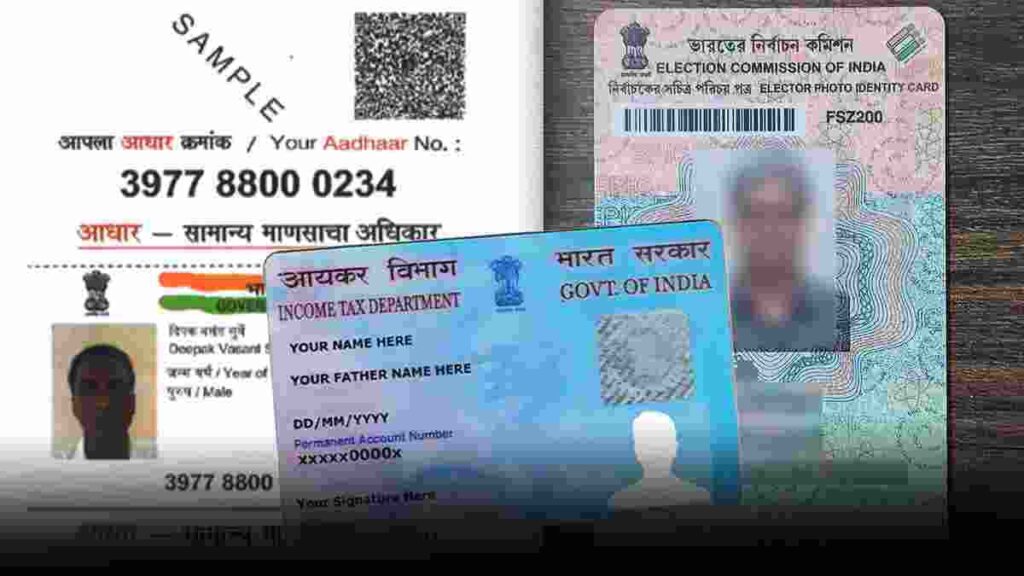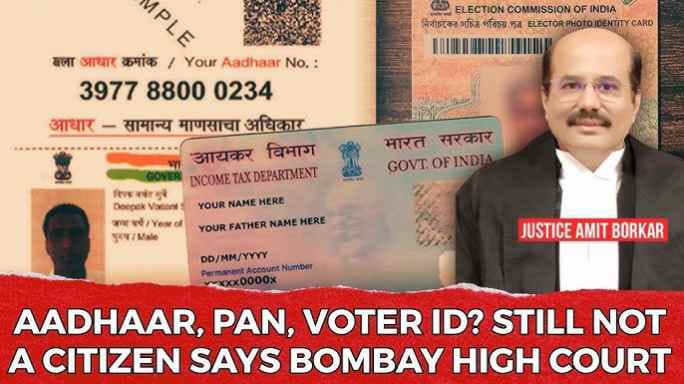Find out which documents truly prove Indian citizenship—like birth certificate, passport, nationality certificate. Know why Aadhaar, PAN, voter ID don’t count.
Real Proof of Indian Citizenship: What Works When Aadhaar, PAN & Voter ID Don’t
Ever wondered what truly proves you’re an Indian citizen? Thanks to a recent Bombay High Court ruling, many are learning that Aadhaar, PAN, and voter ID—even if widely used—aren’t enough in serious situations.
Why Aadhaar, PAN & Voter ID Aren’t Always Enough?
As per a decision by the Bombay High Court, having Aadhaar, PAN, or a voter ID doesn’t automatically make you a citizen. These documents are meant for identity or services, not legal citizenship. In a recent case, a man from Thane had obtained these IDs along with a passport—but the court refused bail, stating that these cards are not legally valid proof of citizenship.

The Legal Angle
Aadhaar identifies residents for services—not born citizens.
PAN card is a tax identifier—it doesn’t confirm nationality.
Voter ID allows you to vote—it’s not legal proof of citizenship.
So, if your citizenship is ever questioned—especially in legal or court settings—these alone won’t help.
Which Documents Actually Prove Citizenship?
Here’s a list of documents that do count:
Birth Certificate (issued in India) – Powerful when you’re born in the country.
Valid Indian Passport – Direct proof and internationally recognised.
Nationality Certificate or Citizenship Certificate – Issued by government officials in special cases.
Also Read – Pavel Durov Plans To Share 17$ Billion.
Certificate of Naturalisation or Registration – For those who become citizens through legal means.
Parent’s Citizenship Proof – Especially useful if born in India with Indian parents.

How the Election Commission Uses Citizenship Proof
When the ECI conducted a voter roll revision in Bihar, they asked applicants to provide birth and citizenship proof—not just Aadhaar or voter ID. Acts like pre-filled forms and self-declarations clarified how your citizenship was based—like by birth or registration.
FAQs on Citizenship Proof
Q1: Why isn’t Aadhaar proof of citizenship?
Because it’s for identity and services only—not legally recognized for confirming nationality. UIDAI itself clarified this.
Q2: Does having a passport always count as citizenship proof?
Yes—as long as it’s valid and genuine. But courts may still ask for additional documents if authenticity is in doubt.
Q3: What if someone was born abroad?
They could use their parents’ Indian citizenship documents or a citizenship certificate issued by an Indian authority.
Q4: Can school or land records work?
They can support your claim but usually serve as secondary evidence—not as standalone proof.
Q5: What role do parents’ documents play?
Very important—especially if your birth certificate is missing. Courts and officials may ask for your parents’ proof when needed.
Quick Summary Table
| Document Type | Use as Citizenship Proof? |
| Aadhaar Card | No Just identity and residence. |
| PAN Card | No Meant for tax tracking only. |
| Voter ID | No For voting, not legal nationality proof. |
| Birth Certificate | Yes Strongest if born in India. |
| Indian Passport | Yes Widely accepted, globally valid. |
| Nationality / Citizenship Certificate | Yes Issued by authorities for legal purposes. |
| Naturalisation / Registration Cert. | Yes For those who became citizens later. |
| Parents’ Citizenship Proof | Yes (conditional) Helps if birth certificate isn’t clear. |
Final Thoughts
Let’s keep it simple: Aadhaar, PAN, and voter ID are useful for daily work, but not enough when citizenship is questioned. Always keep key documents like your birth certificate or passport safe. If you’re born abroad, make sure your parents’ records or a citizenship certificate are handy.
If you ever feel stuck or unsure, it’s wise to visit your local government office or electoral office to understand what specific documents you might need. That little clarity can save big stress later.

[…] Also Read – Real Proof For Indian Citizenship. […]